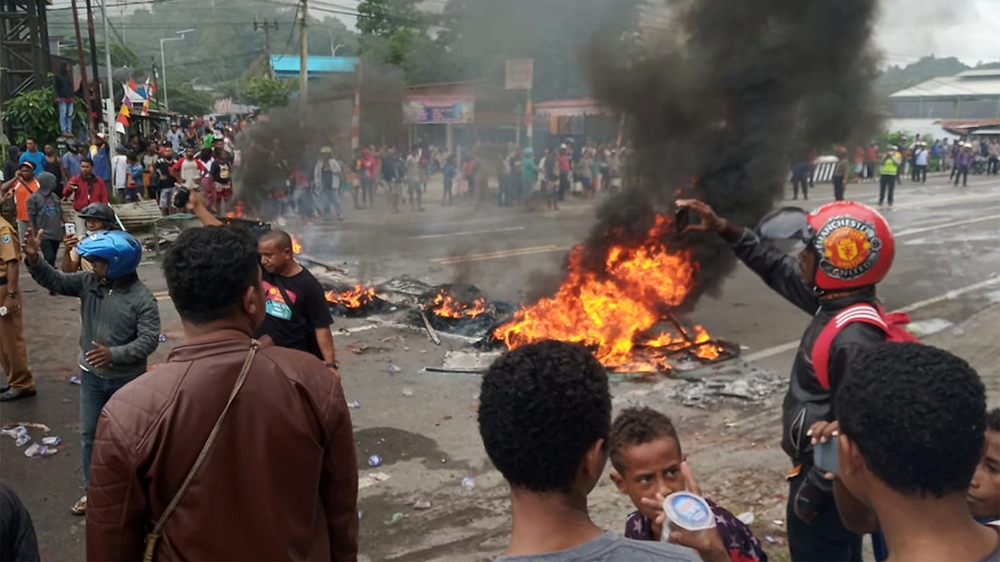Indonesia’s Jokowi urges calm after violent West Papua protests
President’s security minister says protests had been contained and pledges fair investigation into what led to unrest.

Indonesian President Joko Widodo has sought to ease tensions after violent protests in several cities in the West Papua region that erupted following claims of racist abuse and physical mistreatment of Papuan students.
In a statement late on Monday, the president, also known as Jokowi, urged people to forgive each other after the riots, adding that the government will try to look after “the honour and welfare of all people in Papua and West Papua”.
Keep reading
list of 4 itemsIndonesian voters go to the polls to choose a successor to Joko Widodo
‘Disappointed’: Indonesians reflect on legacy of departing Joko Widodo
Voters mull party or family as Indonesian president’s son runs for office
“My brothers and sisters in Papua and West Papua, I know you feel offended. Therefore, as fellow countrymen, to forgive each other is the best. You may get angry but forgiving is better,” Jokowi said.
“It’s OK to be emotional, but it’s better to be forgiving. Patience is also better.”
|
|
Jokowi’s chief security minister, Wiranto, also pledged a “complete and fair” investigation into incidents in East Java that triggered the protests and in Papua, saying the situation in Papua had been contained.
The restive West Papua region is divided into two provinces, West Papua and Papua.
National police chief Tito Karnavian expressed regret over the riots, which he said had been triggered by the treatment of Papuan students and by a hoax about a Papuan student being killed during the detentions in Surabaya.
“There are some people who deliberately stirred this information for their own interests,” Karnavian told reporters in Surabaya. “That is not true, this is a hoax and I call on people in Papua and outside Papua not to be provoked by untrue news.”
A separatist movement has simmered for decades in the West Papua region, where there have been frequent complaints of rights abuses by Indonesian security forces.
Rights abuse allegations
The latest unrest began on last Thursday in Java island when a group of Papuan students, who were holding a pro-independence rally in the city of Malang, clashed with members of a local right-wing organisation and were detained by police for questioning.

On Sunday, police stormed dormitories in Surabaya, Indonesia’s second-largest city, after Papuan students staying there reportedly refused to be questioned over allegations that they had intentionally damaged the red-and-white national flag in the dormitory’s yard.
The students have denied the allegations. They were later released by police on Sunday.
The raid and detentions, as well as the reported racist taunts by bystanders against the Papuan students, angered the West Papua residents, who came out in violent protests on Monday.
|
|
In Manokwari, the capital of West Papua province where the most extreme incidents of burning of public buildings took place, Deputy Governor Mohamad Lakotani said Papuans are demanding an apology for the slur against the students, as well as protection for anyone studying across the archipelago.
In a televised statement following the protests, East Java Provincial Governor Khofifah Indar Parawansa declared, “We apologise because this does not represent the voice of the people of East Java. He called the slur “someone’s personal outburst of emotion”.
The West Papua, the resource-rich western region of the island of New Guinea, is a former Dutch colony that was incorporated into Indonesia after a widely criticised UN-backed referendum in 1969.
There have been allegations of human rights violation taking place since that date.
Unrest has persisted and separatist armed fighters killed a group of construction workers in December 2018, triggering a military crackdown that displaced thousands in the Nduga area.